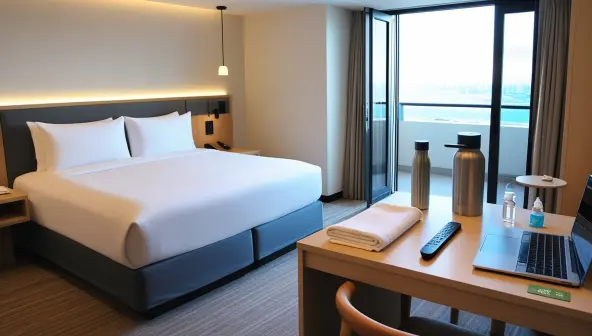We’ve all been there—after a long day of traveling, you finally swipe your key card, excited to drop your bags and relax. But as you step into your hotel room, a little voice inside your head wonders, Is everything as clean as it looks?
I get it. I’ve had that same feeling—checking into what seemed like a pristine room, only to find a stray hair on the nightstand or dust in the corners. And if you’re like me, you want to make sure your space is not only comfortable but truly clean and safe. So before you kick off your shoes and dive into that inviting bed, let’s take a few minutes to transform your room into a personal sanctuary.
This comprehensive guide ensures you’ll cover the essentials—hotel room safety tips, cleanliness, tech, and comfort—all while keeping eco-friendly practices in mind. Let’s dive into the key steps to follow for a safer, cleaner, and more eco-conscious hotel experience.
Hotel Room Safety Tips
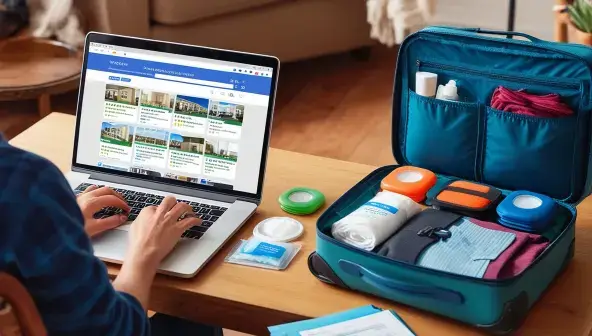
Pre-Arrival Preparation
The hotel stay starts before you even arrive. Taking a few steps beforehand can enhance both your comfort and safety.
- Research: Before booking, research the hotel’s reputation for cleanliness in hotel rooms and safety tips for travelers. Check online reviews to see what previous guests have experienced.
- Pack Essentials: Ensure you have a toiletry kit with disinfectant wipes, reusable containers, and a portable doorstop for added hotel room door safety.
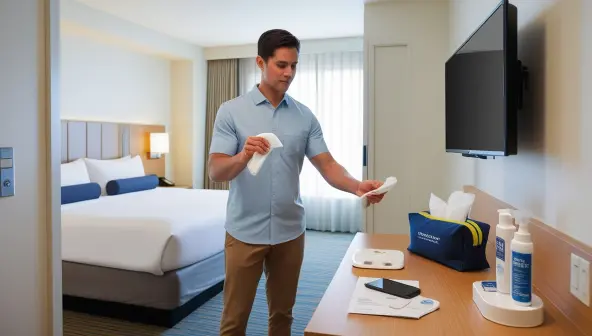
Upon Arrival: Initial Room Inspection (3-5 minutes)
Before unpacking, inspect your hotel room for cleanliness, security, and any potential issues.
- Thorough Scan: Start by scanning the room for cleanliness. Check high-touch surfaces like door handles, light switches, and remotes for any visible dirt or dust.
- Pest Inspection: Examine the bed, linens, and furniture for signs of bed bugs or stains. If you find anything, request a room change immediately.
- Safety First: Test the door’s peephole, ensure all locks work, and confirm that windows are securely shut to ensure proper hotel room door safety.
- Booking Confirmation: Verify that the room meets your expectations (e.g., bed type, non-smoking, or accessible room).
Creating a Clean and Safe Environment (2-3 minutes)
Ensuring your room is both safe and clean is essential for peace of mind.
- Sanitize High-Touch Areas: Even a clean-looking room can harbor germs. Wipe down light switches, door handles, remote controls, and bathroom fixtures.
- Secure Valuables: Use the in-room safe or hide your valuables in discreet places if a safe isn’t available. This step is crucial for important items like passports and electronics to maintain hotel safety tips for travelers.
- Emergency Preparedness: Familiarize yourself with the hotel’s emergency exits and procedures in case of fire or other emergencies.
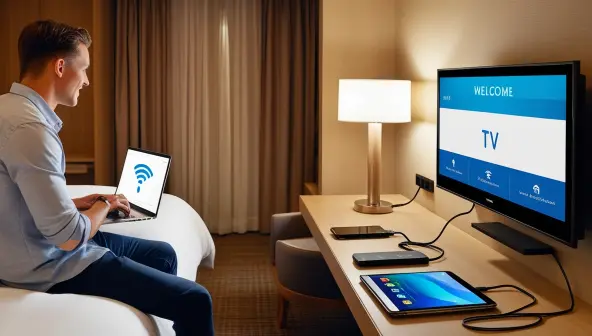
Tech Check (3-5 minutes)
Verify that all electronics are functioning properly so you can avoid frustrations later.
- Wi-Fi: Test the Wi-Fi connection and speed to ensure it works seamlessly.
- Electronics: Check that the TV, remote, phone, and any other gadgets are in working order.
- Power Outlets: Make sure there are enough outlets for charging your devices. If not, consider using a power strip.
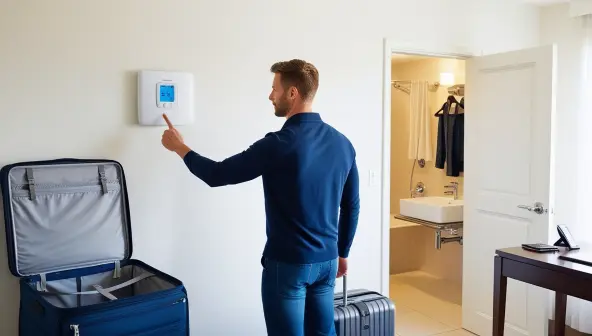
Enhancing Comfort and Convenience (1-2 minutes)
Once the essentials are taken care of, focus on your comfort.
- Climate Control: Adjust the room temperature to your liking by setting the thermostat.
- Bathroom Basics: Test the water pressure, hot water availability, and ensure the toilet flushes properly.
- Unpack Strategically: Organize your belongings for easy access. Hang up your clothes to avoid wrinkles and set up a designated spot for important items like your phone, wallet, and keys.
Eco-Friendly Practices
Traveling doesn’t mean abandoning sustainability. Small choices can make a big difference.
- Eco-Friendly Toiletries: If the hotel offers refillable dispensers, use them. Otherwise, opt for reusable or biodegradable toiletries, like bamboo toothbrushes.
- Conserve Energy: When leaving the room, turn off the lights, TV, and adjust the thermostat to save energy.
- Reduce Waste: Bring your own reusable products and opt for minimal-waste packaging to cut down on single-use plastic.
Additional Tips and Final Check (2-3 minutes)
Before you fully relax, take care of any final details.
- Communicate Issues: If you notice anything amiss, don’t hesitate to contact the front desk and request assistance or a room change.
- Trust Your Instincts: If you feel uneasy or something seems off, trust your gut. Safety always comes first.
- Ice Bucket Hack: Clean the ice bucket before use—it’s often overlooked during routine cleanings.
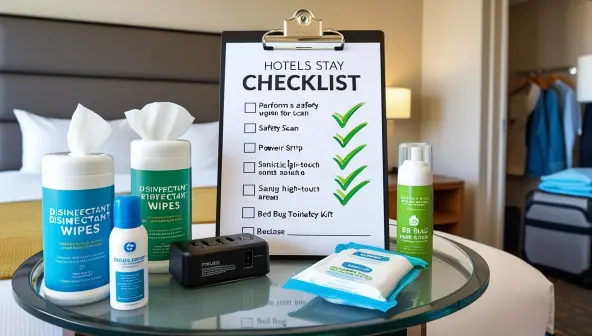
Hotel Room Survival Checklist
Things You’ll Need:
Quick Checklist:
[ ] Perform a safety and cleanliness scan (dust, pests, and room amenities).
[ ] Sanitize high-touch areas (light switches, door handles, remotes).
[ ] Verify locks and check emergency exits.
[ ] Test the Wi-Fi, phone, and TV.
[ ] Check water pressure and temperature in the bathroom.
[ ] Unpack and organize your personal items.
[ ] Embrace eco-friendly practices (energy conservation, reusable products).
By following these steps and utilizing the checklist, you’ll have a safer, cleaner, and more comfortable stay—all while keeping eco-consciousness in mind.
FAQs
1. What essential items should I pack for a hotel stay?
- Packing for a hotel stay depends on personal preference, but essential items include disinfectant wipes for cleanliness, a portable doorstop alarm for hotel room door safety, and eco-friendly toiletries to maintain sustainability. Don’t forget a power strip for electronics and a small first-aid kit for unexpected needs.
2. How can I ensure my hotel room is secure?
- Hotel room safety tips for travelers include always locking your door, using the peephole to verify visitors, and keeping valuables in the room safe. You can also bring a door wedge or portable doorstop alarm to add an extra layer of hotel room door safety, especially in rooms with weaker locks.
3. What tips are there for getting a good night’s sleep in a hotel?
- To sleep well in a hotel, adjust the climate control for comfort, pack a sleep mask and earplugs to block out light and noise, and make sure the room is free of distractions (like electronics) before bed. Choosing a room away from the elevator or high-traffic areas can also improve sleep quality.
4. How do I handle noise issues in a hotel room?
- If you encounter noise issues, request a room away from elevators, ice machines, or pool areas. Many hotels will happily relocate you if noise is a persistent issue. You can also pack noise-cancelling headphones or earplugs for added peace.
5. What should I do if I find a cleanliness issue in my room?
- Cleanliness in hotel rooms is a top priority. If you find issues, alert the front desk immediately. Most hotels will offer to clean the room or move you to a different one. Always check high-touch surfaces like light switches, remotes, and door handles upon arrival.
6. How can I save money on hotel room bookings?
- To save money, consider booking directly through the hotel or use reputable third-party sites to compare rates. Booking in advance or looking for deals during off-peak travel times can also save you money. Additionally, joining loyalty programs or using travel credit cards can provide discounts and rewards.
7. What are common hotel room scams to be aware of?
- Be cautious of phone calls asking for credit card information under the guise of “front desk issues.” Scammers may call your hotel room pretending to be hotel staff. Always verify any requests by calling the front desk directly. Additionally, always use the peephole before opening the door, and never share personal information with strangers.
References
Energy Waste: Energy Star research shows that lighting, heating, and air conditioning account for more than 60% of a hotel’s energy use. Turning off lights and the A/C when leaving your room can significantly reduce unnecessary energy consumption.
Cleanliness Concerns: According to a study by Travel Math, some of the dirtiest spots in hotel rooms are high-touch surfaces like remote controls and light switches, which harbor significantly more bacteria than the bathroom sink or even the toilet. This highlights the importance of sanitizing these areas yourself.
Hotel Water Usage: The U.S. Environmental Protection Agency (EPA) estimates that hotels use 15% of all water consumed by the hospitality industry, with laundry services accounting for a significant portion of this. By reusing towels and linens, you can help conserve water.
Hotel Room Safety: A report from The New York Times indicates that over 500,000 hotel break-ins occur each year worldwide, emphasizing the importance of securing your room with hotel room safety tips for travelers like using secondary locks or portable alarms for added protection.
Independent Traveler: Hotel Room Cleanliness Tips
Travel + Leisure: Hotel Packing Checklist
Forbes: Hotel Room Safety Guide
The New York Times: How to Sleep Better in Hotels
Lonely Planet: Dealing with Noise in Hotels
The Best Flight Booking Sites: Which One’s Right for You?
Best Hardside International Travel Luggage for Your Next Adventure
Choosing The Best Luggage For International Travel
The Best Travel Gear To Make Long Flights More Bearable
How To Make A Long Flight Comfortable
24 Best Amazon Top Travel Essentials Under $20
New York State’s Bold Move to Ditch Travel Toiletry Bottles

